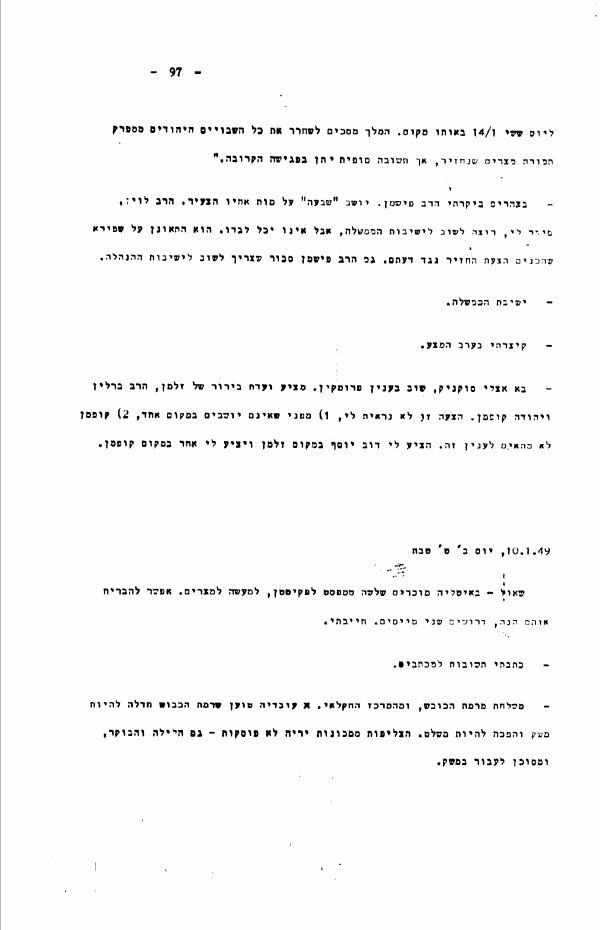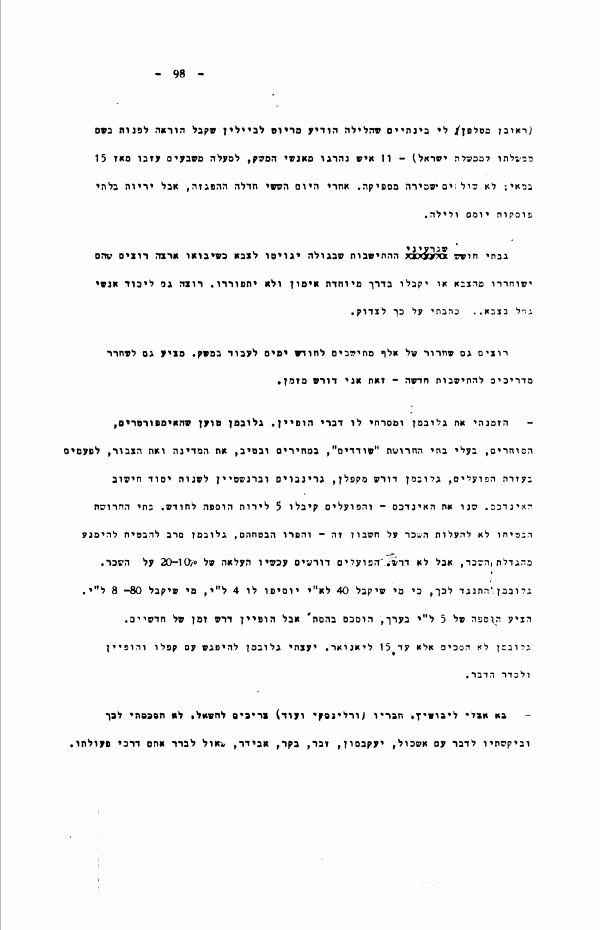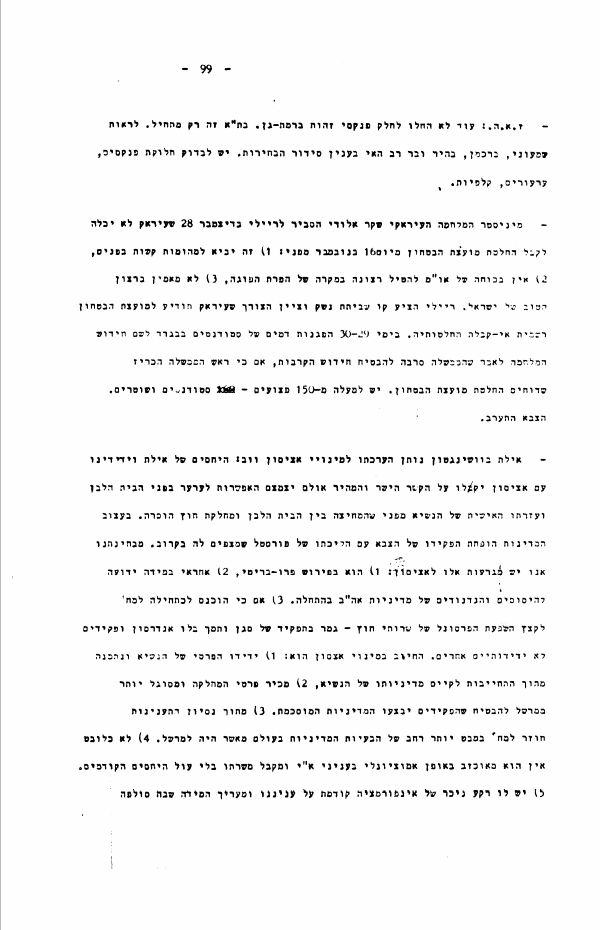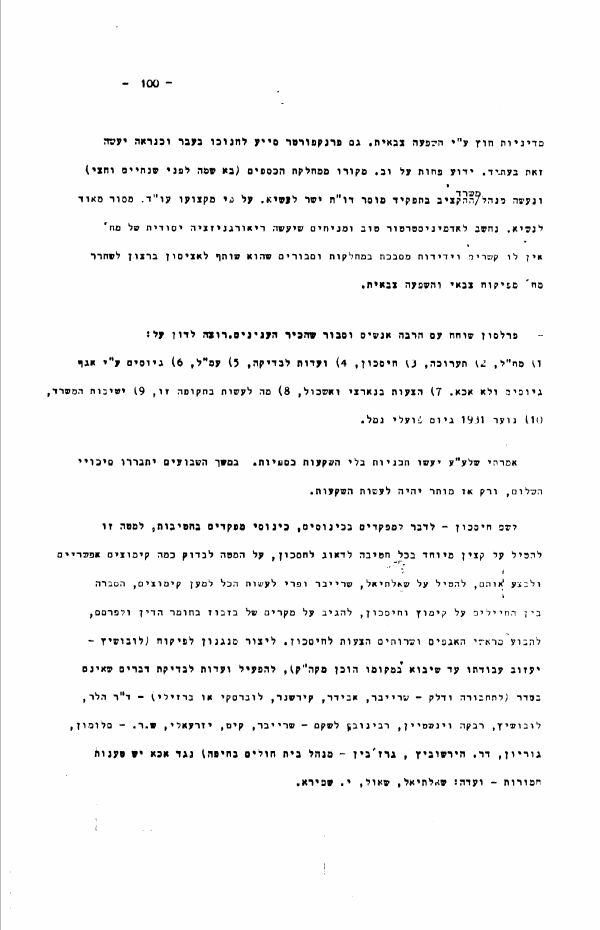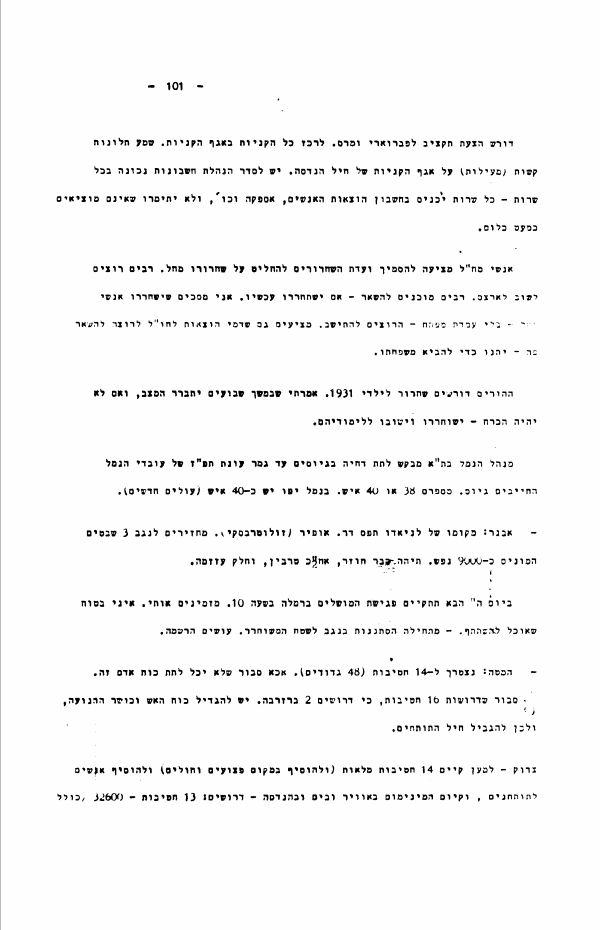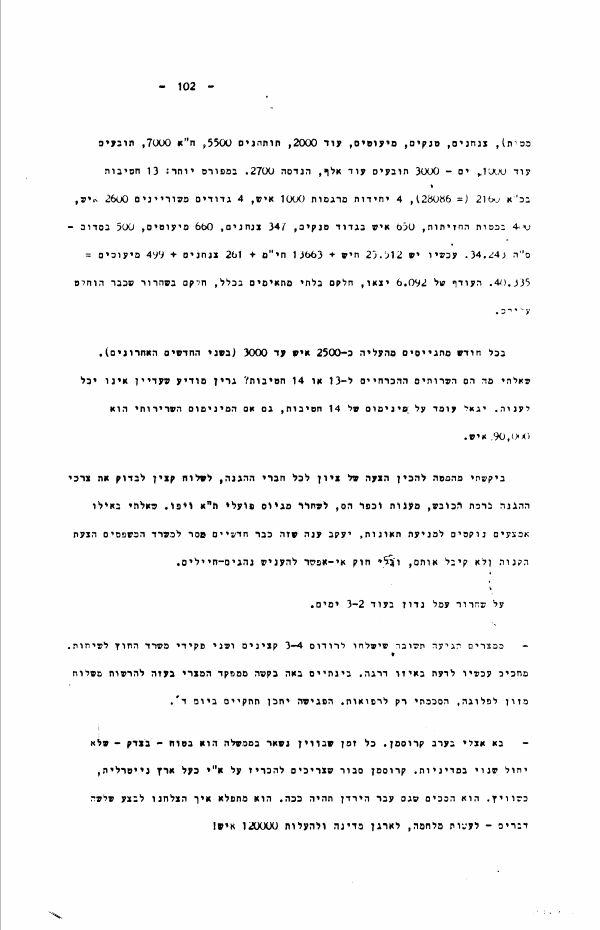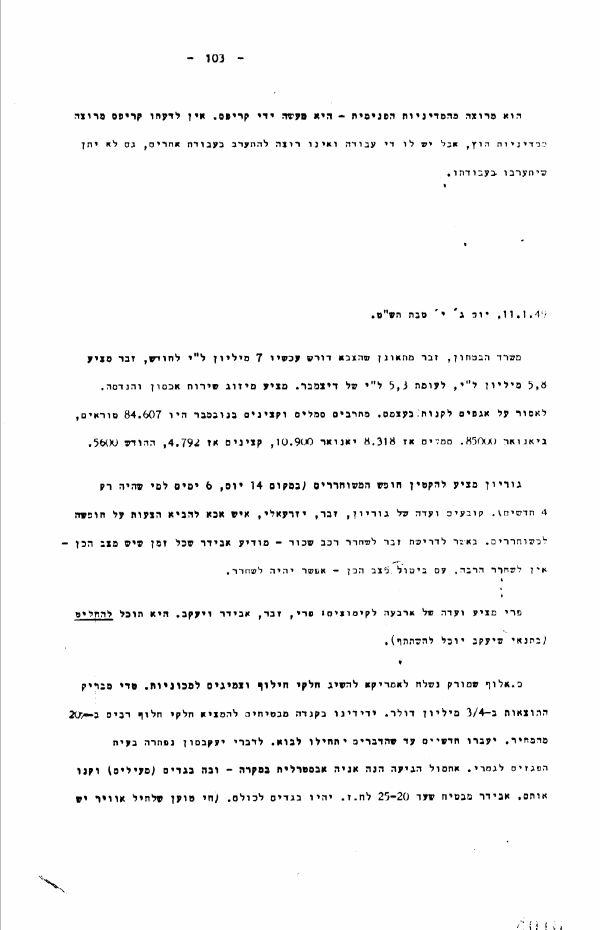Monday, January 10, 1949
Shaul [Avigur]: In Italy three [Tempest] planes are being sold to Pakistan, in practice to Egypt. They can be smuggled here. Two pilots are needed. I affirmed.
- A delegation from Ramat HaKovesh, and the Agricultural Center. Ovadia [Porat] claims that Ramat HaKovesh stopped being a kibbutz and has become a stronghold. The machine gun sniper fire is incessant - both at night and in the morning, and it's dangerous to work on the farm.
[In the midst of documenting the conversation with Ramat HaKovesh members, Ben-Gurion made note of the following telephone conversation:] (Reuven [Shiloah] telephoned me in the meantime [to say] that tonight Marriott [the British consul in Haifa] informed [Harry] Beilin that he'd received instructions to approach the government of Israel on behalf of his own government.)
11 members of the kibbutz have been killed, [and] more than 70 have left since May 15; not enough guards are being sent. After the sixth day [Iraqi] shelling stopped, but there is incessant gunfire day and night.
- [Haim] Gvati is concerned that the settlement-designated core groups in the Golah will be conscripted into the army when they arrive in the country. They want them to be released from the army or receive special training and not disband. He also wants GAHAL [foreign recruitment] members [who are] in the army to be consolidated. I wrote to [Moshe] Zadok [head of the Personnel Department] about this.
They also want a thousand settlers to be released for a month to work on the kibbutz. He also proposes releasing counselors for new settlement. I have long been demanding this.
- I summoned Globman and conveyed Hoofien's remarks. Globman claims that the importers, the merchants, [and] the factory owners are "robbing" the state and the public in terms of prices and quality, sometimes with the help of workers; Globman is demanding that Kaplan, Gruenbaum, and Bernstein change the basis for calculating the index. [They] changed the index - and the workers received 5 additional liras per month. The factories promised not to raise wages on the basis of this calculation - and broke their promise; Globman refused to promise to refrain from raising wages, but didn't demand [this]. Now the workers are demanding a 10-20% wage increase. Globman objected to this, because someone receiving P£ 40 will be supplemented P£ 4, someone receiving 80 - P£ 8. He proposed an addition of about P£ 5, which was agreed upon in the Hist. [Histadrut] but Hoofien insisted on a period of two months. Globman didn't agree beyond January 15. I advised that Globman meet with Kaplan and Hoofien and sort things out.
- Leibowitz came to see me. His friends (Verlinsky etc.) need to be asked. I did not agree to this and I asked that he speak with Eshkol, Yaakovson, Zabar, Becker, Avidar, [and] Shaul to clarify his modes of operation with them.
- Ziama: ID cards are not yet being distributed in Ramat Gan. In Tel Aviv it's just beginning. [Need] to see Shimoni, Brachman [sp.], Bahir, and Bar Rav Hai regarding election arrangements. Need to check on the distribution of cards, appeals, polling stations.
- Iraqi Minister of War Shakir al-Wadi told Riley on December 28 that Iraq cannot accept the Security Council resolution of November 16 because 1) it will lead to fierce internal rioting, 2) the UN does not have the power to impose its will in the event that the truce is violated, 3) he doesn't believe in Israel's goodwill.
Riley proposed an armistice line, and noted the need for Iraq to officially inform the Security Council that it doesn't accept its decisions. On [December] 29-30 there were violent demonstrations by students in Baghdad after the government refused to promise a renewal of hostilities, although the prime minister did announce that they were rejecting the Security Council resolution. There were more than 150 wounded - students and policemen. The army intervened.
- From Washington, [Eliahu] Elath provides his assessment of the appointments of [Dean] Acheson and [James] Webb: Elath's and our friends' relations with Acheson will take the form of direct and prompt contact, but [this contact] will reduce the possibility for appealing to the White House and [receiving] personal help from the president, because the partition between the White House and the Foreign Department [should be: State Department] has been removed. With the departure of [James] Forrestal, which is anticipated soon, the army's role in shaping policy will diminish.
From our perspective Acheson poses the following drawbacks: 1) He's explicitly pro-British. 2) [He's] somewhat responsible for the initial hesitations and vacillations in US policy. 3) Although he was initially placed in the FD [Foreign Department, i.e., State Department] to reduce the influence of foreign service personnel, he ended up in a deputy position and supported Loy Henderson and other unfriendly officials.
The positive aspect of Acheson's appointment is: 1) [He's] a personal friend of the president, and was appointed out of a commitment to carrying out the president's policy. 2) [He] knows the inner workings of the Department and is better able than Marshall to ensure that the officials carry out the agreed-upon policy. 3) Given his experience and interest, he returns to the FD [SD] with a broader view of the political problems in the world than Marshall had. 4) Unlike Lovett, he is not emotionally disappointed by matters involving Eretz Israel, and he takes on his position without the burden of previous relations. 5) He has significant background information about the past as it relates to us, and appreciates the extent to which foreign policy was distorted by military influence. [Supreme Court Justice Felix] Frankfurter has also helped educate him in the past, and will apparently do so in the future. Less is known about Webb. He started out in the Department of the Treasury (joined two and a half years ago) and became director of Bureau of the Budget, reporting directly to the president. A lawyer by profession. Very devoted to the president. Considered a good administrator and its presumed that he will conduct a thorough reorganization of the FD [SD]. He doesn't have ties or a complicated friendship with the departments, and they think that he shares Acheson's desire to free the FD [SD] from military oversight and military influence.
- Perlson [Eliezer Peri] spoke with many people and believes he understands the issues. He wants to discuss: 1) MAHAL [foreign volunteers], 2) Exhibition [?], 3) Frugality, 4) Assessment committees, 5) AMAL [military reservists conscripted for fixed periods of time], 6) Conscription by a conscription department and not by the Personnel Department, 7) Benartzi's and Eshkol's proposals, 8) What to do during this period, 9) Ministry meetings, 10) 1931[-born] youth [and] conscription of port workers.
I said that for now they should make plans without financial investments. Over the next two weeks the chances for peace will become clear, and only then will investments be possible.
For the sake of frugality - to speak to the commanders at assemblies, assemblies of brigade commanders. To task a special officer with ensuring frugality; the Staff should examine what cuts are possible and implement them, to task Shaltiel, Schreiber, and Peri with doing everything for the sake of cuts, hasbara [explanation, public relations] among soldiers on cuts and frugality; to react with the force of law to instances of waste and to publicize [them]. To require proposals for savings from the heads of departments and services. To create a mechanism for oversight (Luboschitz [sp.] - will leave his work until Hochen [sp.] from HaKeren HaKayemet replaces him), to mobilize committees to examine things that are not proper (for transport and fuel - Schreiber, Avidar, Kirschner, Lubrasky [sp.] or Barzilai) - Dr. Heller, Luboschitz [sp.], Rivka Weinstein, Rabinov, for the Shekem [army food service] - Schreiber, Kit [Kim? Keith?], Yizraeli; M.S. [medical service?] - Solomon, Gurion, Dr. Hirschovitch [sp.], Grazhbin [sp.] - director of a hospital in Haifa); there are severe complaints against the Personnel Department - a committee: Shaltiel, Shaul, Y. Shapira.
He demands a proposed budget for February and March. To concentrate all the procurements in the Procurements Department. He heard serious complaints (embezzlement) regarding the Engineering Corps Procurements Department. A proper system of accounting should be established in each service - each service will account for expenses in personnel, supplies, etc., and not pretend that they spend almost nothing.
MAHAL personnel. [Peri] proposes authorizing the exemptions committee to decide on releases from MAHAL. Many want to return to their countries. Many are prepared to stay - if they are discharged now. I agree to the discharge of MAHAL personnel - other than [those in] key positions - who want to settle [here]. They propose that the costs [for returning] abroad be given to whoever wants to stay in order to bring his family over.
Parents are demanding the release of those born in 1931 [17-year-olds, conscripted during the first truce]. I said that within two weeks the situation will become clear, and if it's not necessary - they'll be discharged and will return to their studies.
The manager of the Tel Aviv port requests that conscriptions be postponed until the end of the orange [?] season for the port workers subject to conscription. They total 38 or 40 men. At the Jaffa port there are about 40 men (new immigrants).
- [Major-General] Avner: 3 tribes numbering about 9,000 persons are being returned to the Negev. The Tiyaha [tribe] is already returning, then the Tarabin [tribe] and part of the ''Azazmeh [tribe].
Next Thursday the governors will hold a meeting in Ramle at 10. They're inviting me. I'm not sure I will be able to join. - Infiltration into the liberated territory in the Negev is beginning to take place. Registration is being conducted.
- The Staff: We'll need 14 brigades (48 battalions). The Personnel Department doesn't think it will be able to provide this manpower. [The Operations Department] thinks that 16 brigades are needed, because two are needed for reserves. Manpower and mobility need to be increased, and therefore the Artillery Corps [needs to be] limited [should be: increased].
Zadok - in order to maintain 14 full brigades (and to add replacements for the wounded and ill) and to add men to the Artillery Corps, and to maintain the minimum in Air [Force] and the Navy and Engineering [Corps] - [the following] are required: 13 brigades - 32,600 (including staffs), paratroopers, tanks, Minorities, another 2,000, Artillery Corps 5,500, AF 7,000, they demand another 1,000, Navy - 3,000 they demand another thousand, Engineering 2,700. More specifically: 13 brigades, in each 2,160 (= 28,086), 4 mortars units 1,000 men, 4 armored units 2,600 men, 400 in the front staffs, 600 men in the tanks battalion, 347 paratroopers, 660 Minorities, 500 in Sdom - total 34,243. Currently there are 25,512 Hayish + 13,663 garrison + 261 paratroopers + 499 Minorities = 40,335. The surplus of 6,092 left, some are completely unsuitable, some being discharged by earlier decision.
Each month about 2,500 to 3,000 men are conscripted from ''aliya [new immigrants] (during the last two months). I asked what the necessary services are for 13 or 14 brigades. Green said that he cannot yet answer that. Yigael insists on a minimum of 14 brigades, even if the existing minimum is 90,000 men.
I asked the Staff to prepare a proposal for [military] decoration for all the Haganah members, to send an officer to assess the Haganah needs at Ramat HaKovesh, Ma'anit, and their villages, to release the Tel Aviv and Jaffa [port] workers from military service [for the fruit harvest season]. I asked what measures they take to prevent [road] accidents. Ya'akov [Dori] replied that two months ago he gave the Ministry of Justice a proposal for regulations and it hasn't accepted them, and without a law it's impossible to punish soldier-drivers.
We will discuss AMAL releases 2-3 days from now.
- A reply arrived from Egypt, [saying] that they would send 3-4 officers and two Foreign Ministry officials to Rhodes for the talks. Now waiting to find out what rank. In the meantime a request came from the Egyptian commander in Gaza, to allow a food shipment to Faluja. I agreed only to medicine. The meeting will, possibly, take place on Wednesday [January 12].
- In the evening [Richard] Crossman came to see me. As long as Bevin remains in the government, he's certain - rightly - that there won't be any change in policy. Crossman thinks that we should declare Eretz Israel to be a neutral country, like Switzerland. He agreed that Transjordan would be the same. He marvels at how we were able to achieve three things - to conduct a war, to organize a state, and to bring 120,000 immigrants!
He's pleased with the [British] internal policy - it's the handiwork of [Stafford] Cripps. In his view Cripps is not pleased with the foreign policy, but he has enough work and does not want to interfere in the work of others, nor will he allow [others] to interfere in his work.





